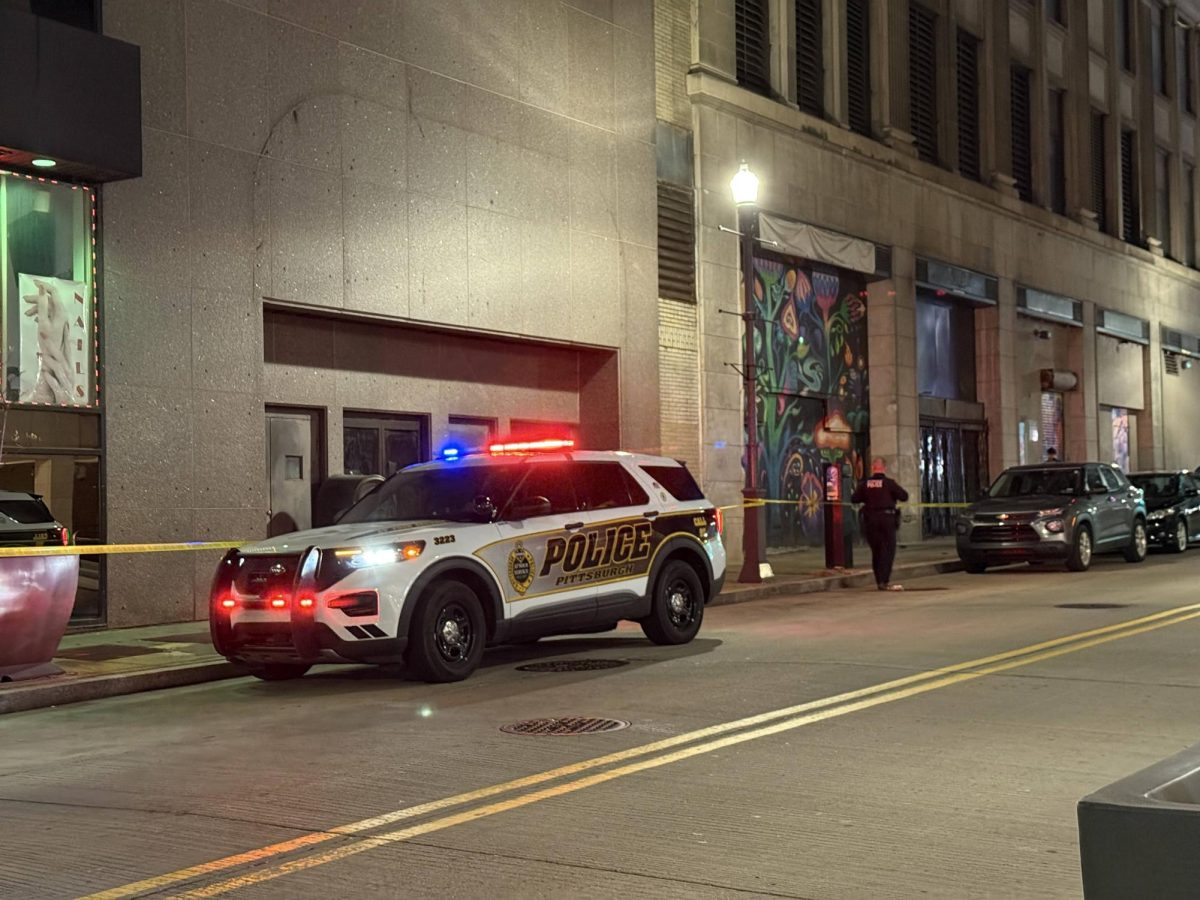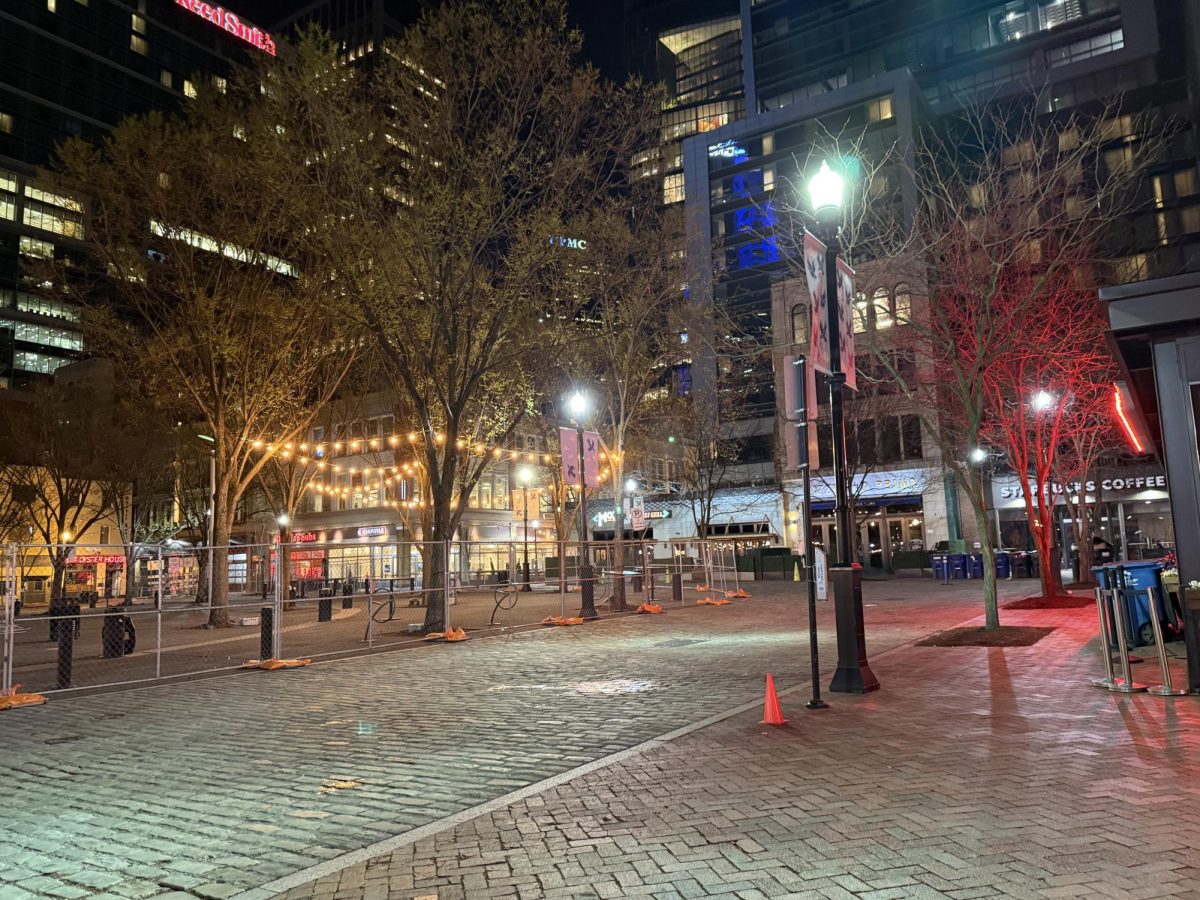
photos by Matt Nemeth
Purchased by the School of Communication in 2014, the DJI Phantom drone has since been kept grounded amid evolving federal requirements. Associate Professor of Photography and Photojournalism, Chris Rolinson, plans to meet these requirements in the near future so that students may eventually be able to benefit from its advanced technology.
When Point Park’s School of Communication purchased a drone aircraft in 2014, the head of the photography program believed it was a pioneering move that would push his students’ education to the forefront of media industry innovation.
Two years later, the drone remains grounded after a ruling that decided its use would be for commercial purposes, despite Point Park University’s status as a non-profit organization under federal law and its intent as strictly an educational tool.
Point Park’s Senior Vice President and General Counsel, Amy McCall, declined to be interviewed about the matter, but did confirm in an email on Feb. 4 that, “at this time, any use of a drone by the university is not considered to be for a hobby or recreational purpose.”
In December 2015, the Federal Aviation Administration (FAA), the US government agency responsible for regulating the country’s air traffic laws, began requiring the registration of drones for commercial and recreational use. In addition to registration, all drone operators that don’t meet special recreational and hobby exemption requirements must receive a flying certification.
Chris Rolinson, Associate Professor of Photography and Photojournalism, was not expecting such complications when he asked university officials if it was ok to purchase a drone during the spring 2014 semester.
“I asked one time and I got it, so I mean I didn’t have to push very hard,” Rolinson said.
Rolinson knew drone photography was surging in popularity and he believed it would be a good idea to initially train himself so that he could then teach his students to use them. He never intended for the drone to be used for commercial purposes, but rather as a new tool for teaching.
“Shortly thereafter, the federal government put a moratorium on using them for commercial purposes, and that got me into asking questions with the university,” said Rolinson. He inquired whether its use would qualify as a commercial operation even though the University is a non-profit organization. He was told that it was commercial and that the drone could not be used for student instruction.
The drone in question is a DJI Phantom. It has four propeller blades and a GoPro camera attached to the bottom by a gimbal. It is also relatively small, nearly 14-inches in length and weighing just over 2.5 pounds, keeping it within the FAA’s weight requirements. Rolinson occasionally flew the drone himself and, since its grounding, has kept it at his house.

The School of Communication was not the only area at Point Park to have to address the changing federal drone regulations. When Terry Shirk, the Cinema Arts Department’s Safety Coordinator, started his position in August 2015, he was tasked with updating the department’s student production handbook to include the FAA’s new drone regulations.
“Up to that point there was no section on drones,” said Shirk.
According to Shirk, physical copies of the updated handbook were made available to students in introductory film classes since last December, while a digital version is available online. It lists many of the FAA’s current guidelines, requires that drones used for student productions must be registered with the FAA and instructs students to turn in a copy of that registration to the Safety Coordinator’s office.
Shirk believes the use of drones by the film students would not currently be considered commercial. He was not previously aware that the School of Communication owned a drone, but admits the difference in interpretation might have to do with ownership. The Cinema Arts Department does not currently own a drone, meaning the students that do use them must use their own.
Sophomore cinema production major, David Randolph, was able to borrow his friend’s drone last year while shooting his sophomore production project.
“When it comes down to the legality of it, I’m not one hundred percent sure how that works, but for my film it was really an absolutely beautiful shot,” Randolph said. He obtained permission from the owner of the private park he was filming in and from the safety coordinator.
“However,” said Randolph, “certain teachers after the fact said I probably won’t be allowed to do that again.” He believed drones generally wouldn’t be allowed for school related films unless special permission was granted, but admits that their might be some confusion within the department.
Because of the new federal restrictions, Rolinson is uncertain about the future of drone use at the School of Communication.
“Because of that licensing process I’m not certain that students are ever going to be able to got to SPS and say, ‘Hey, give me a drone.’”
However, he does have some hopes for what is to come. He plans to register the drone with the FAA soon and complete the necessary flying certification in the coming summer.
In an ideal scenario, Rolinson envisions a class dedicated to drone flying where students are educated on drone safety and laws, eventually receiving a certification.
“There’s a lot of potential for a lot of people to have a reason to know how to do it,” said Rolinson. “But, the regulation right now makes it so that it’s probably not the right thing to do at this moment.”







